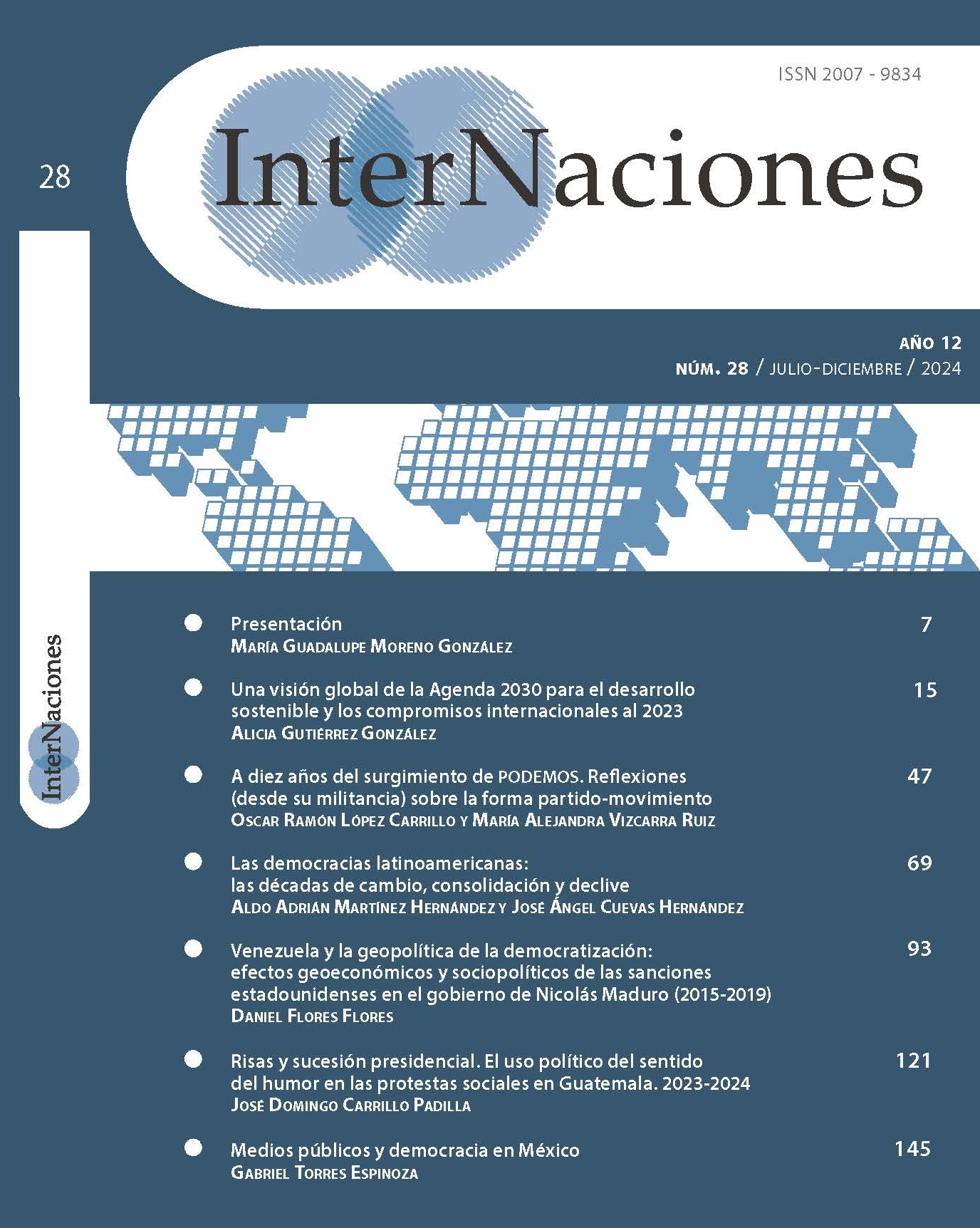Venezuela and the geopolitics of democratization: geoeconomic and sociopolitical effects of us sanctions on the government of Nicolás Maduro (2015-2019)
DOI:
https://doi.org/10.32870/in.vi28.7288Keywords:
Geopolitics of democratization, Democratizing sanctions, Geoeconomic effects and sociopolitical effects, Venezuela, United SatesAbstract
This paper aims to analyze the geoeconomic and socio-political effects of the democratizing sanctions imposed by the us government on the government of Nicolás Maduro through executive orders between 2015 and 2019. Geopolitics is employed as a field of study where various disciplines that explore the projection of power in space converge, and Geoeconomics, which focuses on the relationship between economic power and a more abstract space. The results indicate that these sanctions, instead of democratizing Venezuelan politics, are counterproductive for two main reasons: first, they aggravate the economic crisis, and second, foreign intervention through sanctions distorts policy-making in fragile democracies such as VenezuelaDownloads
References
Arnson, C. J. (2021). Introduction. En C. J. Arnson (ed.), Venezuela’s Autho-ritarian Allies: The Ties That Bind? (pp. 4-21). Washington, d. c. Wilson Center’s Latin American Program.
Brun, E. (2022). La gran desbandada: ondas expansivas de la crisis política venezolana para la inserción internacional de América Latina y el Caribe. En G. González González, J. C. Olmeda y J. Prud’homme (coords.), Go-bernanza democrática y regionalismo en América Latina (pp. 471-507). Ciudad de México. El Colegio de México.
Bull, B. y Rosales, A. (2023). Cómo las sanciones a Venezuela abrieron paso a un capitalismo autoritario. Nueva Sociedad, (304), 112-125.
Carim, X, Klotz, A. y Lebleu, O. (1999). The Political Economy of Financial Sanctions. En N. C. Crawford y A. Klotz (eds.), How Sanctions Work: Les-sons from South Africa (pp. 159-177). Londres. Macmillan Press Ltd.
Chomsky, N. (2016). Hegemonía o supervivencia: La estrategia imperialista de Es-tados Unidos. Barcelona. B de bolsillo.Congressional Research Service (30 de noviembre de 2022). Venezuela: Over-view of u. s. Sanctions. https://sgp.fas.org/crs/row/IF10715.pdfCrawford,
N. C. (1999). Trump Card or Theater? An Introduction to Two Sanctions Debates. En N. C. Crawford y A. Klotz (eds.), How Sanctions Work: Lessons from South Africa (pp. 3-24). Londres. Macmillan Press Ltd.
David, R. y Holliday, I. (2012). International Sanctions or International Jus-tice? Shaping Political Development in Myanmar. Australian Journal of International Affairs, 66(2), 121-138.
Domínguez Martín, R. (2021). Geopolítica y geoeconomía: perspectiva histórica y del complejo integracionista latinoamericano. En D. Benzi, R. Do-mínguez Martín, G. Lo Brutto, G. Rodríguez Albor (eds.), Geopolítica y geoeconomía de la cooperación entre China y América Latina y el Caribe (pp. 13-82). Puebla/Santander.buap/Editorial Universidad de Cantabria.
El Fakih, N. (2020). Aproximación al Régimen de Sanciones Internacionales y al caso de Venezuela (Documento para discusión núm. Idb-dp-840). Banco Interamericano de Desarrollo. http://dx.doi.org/10.18235/0002968
Estrada Álvarez, J. (2020). La intensificación de las luchas por la (re)configu-ración del poder en Nuestra América y las estrategias de la derecha. En J. Estrada Álvarez, C. Jiménez Martín y J. F. Puello-Socarrá (eds.), ContraNuestra América: estrategias de la derecha en el siglo xxi (pp. 19-50). Buenos Aires. CLACSO.
Evans, G. (2017). Commonwealth Diplomacy and the End of Apartheid. The Round Table, 106(1), 61-69.
Funes, P. (2018). Historia mínima de las ideas políticas en América Latina. Ciudad de México. El Colegio de México.
Gratius, S. y Ayuso Pozo, A. (2020). Sanciones como instrumento de coerción: ¿cuán similares son las políticas de Estados Unidos y la Unión Europea hacia Venezuela? América Latina Hoy, 85, 31-53.
Hadar, L. T. (1998). u. s. Sanctions against Burma: A Failure on All Fronts (Trade Policy Analysis núm. 1). Cato Institute. https://www.cato.org/trade-policy-analysis/us-sanctions-against-burma-failure-all-frontsHart
Robert A. (2000). Democracy and the Successful Use of Economic Sanc-tions. Political Research Quarterly, 53(2), 267-284.
Huissoud, J. y Gauchon, P. (2013). Las 100 palabras de la geopolítica. Ediciones Akal.
Jones, L. (2014). Explaining Myanmar’s Regime Transition: The Periphery is Central. Democratization, 21(5), 780-802.
Jurado I. y Navarrete, R. M. (2021). Economic Crisis and Attitudes Towards Democracy: How Ideology Moderates Reactions to Economic Down-turns. Frontiers in Political Science, 3, 1-12.
Kaempfer, W. H. y Moffett, M. H. (1988), Impact of Anti-apartheid Sanctions on South Africa: Some Trade and Financial Evidence. Contemporary Eco-nomic Policy, 6(4), 118-129.
Klotz, A. (1995). Norms Reconstituting Interests: Global Racial Equality and u. s.Sanctions Against South Africa. International Organization, 49(3), 451-478.
Lorot, P. (2009). De la géopolitique à la géoéconomie. Géoéconomie, 3(50), 9-19. Louis, F. y Beck, H. (2023). ¿Qué retorno de qué geopolítica? Otros Diálogos de El Colegio de México, (23). https://otrosdialogos.colmex.mx/que-retorno-de-que-geopolitica
Manetto, F. (30 de diciembre de 2022). Auge y caída de Juan Guaidó. El País. https://elpais.com/internacional/2022-12-31/auge-y-caida-de-juan-guaido.html
McLean, E. V. y Whang, T. (2014). Designing foreign policy: Voters, special interest groups, and economic sanctions. Journal of Peace Research, 51(5), 589-602.
Mijares, V. M. y Cardozo Uzcátegui, A. (2020). Militares bajo control. Fallas teóricas detrás del estancamiento de Juan Guaidó. Foreign Affairs Latino-américa, 20(2), 16-23.
Montoya-Arango, V. (2010). Las geopolíticas de la seguridad y el conocimien-to: de los controles fronterizos a las amenazas deslocalizadas. Universitas Humanística, (69), 101-114.Noticias ONU (12 de febrero de 2021). Relatora pide a Estados Unidos y la Unión Europea que levanten las sanciones a Venezuela por su devastador efecto en la población. United Nations. https://news.un.org/es/story/2021/02/1488052
Observatorio Venezolano Antibloqueo (s/f). Leyes y órdenes ejecutivas. https://observatorio.gob.ve/leyes-y-ordenes-ejecutivas/
Peksen, D. (2019). Autocracies and Economic Sanctions: The Divergent Im-pact of Authoritarian Regime Type on Sanctions Success. Defence and Pea-ce Economics, 30(3), 253-268.
Piña, C. E. (5 de abril de 2021). La fallida estrategia de Trump en Venezuela. Foreign Affairs Latinoamérica. https://revistafal.com/la-fallida-estrategia-de-trump-en-venezuela/
Piña, C. E. (29 de noviembre de 2021). Is Venezuela really a threat to Latin America and the Caribbean? Al Jazeera. https://www.aljazeera.com/opi-nions/2019/11/29/is-venezuela-really-a-threat-to-latin-america-and-the-caribbean
Ramírez Kuri, G. (2021). Geopolítica en América Latina: Imperialismo y Estado en el Capitalismo Dependiente [Tesis doctoral, Universidad Nacional Autó-noma de México]. Repositorio Athenea Digital. http://ru.atheneadigital.filos.unam.mx/jspui/handle/FFYL_uNam/4835
Rarick, C. A. (2006). Destroying a Country in Order to Save It: The Folly of Economic Sanctions against Myanmar. Economic Affairs, 26(2), 60-63.
Reid, M. (2019). El Continente Olvidado: Una Historia de la Nueva América Lati-na. Ciudad de México. Crítica.
Romero Rebollo, Y. (2023). El rompecabezas de la guerra contra Venezuela. En A. E. Ceceña (coord.), Las guerras del siglo xxi (pp. 247-287). CLACSO/UNAM.
Simon, J. y Parody, G. (2023). The Devil and Democracy in the Global South: Hugo Chávez’s Transnational Populism. Journal of Latin American Studies,55(4), 653-677.
Singer, F. (31 de enero de 2024). Estados Unidos rompe con Venezuela y anuncia el regreso de las sanciones al petróleo. El País. https://elpais.com/america/2024-01-31/estados-unidos-rompe-con-venezuela-y-anuncia-el-regreso-de-las-sanciones-al-petroleo.html
Sutherland, M. (2020). Las sanciones económicas contra Venezuela: consecuencias, crisis humanitaria, alternativas y acuerdo humanitario. Caracas. Programa Venezolano de Educación-Acción en Derechos Humanos (Provea).
Tirado Sánchez, A. (2019). Venezuela. Más allá de mentiras y mitos. Madrid. Ediciones Akal.
Tussie, D. (2021). La costura de la epI en América Latina. ¿Pérdida mal adaptada o simplemente mal percibida? En G. Álvarez, M. Deciancio, G. Mo-lano Cruz, C. Ovando (eds.), La disciplina de las Relaciones Internacionalesen América Latina. Contribuciones, límites y particularidades (pp. 43-65). Santiago de Chile. RIL editores.
Vihma, A. (2018). Geoeconomic Analysis and the Limits of Critical Geopoli-tics: A New Engagement with Edward Luttwak. Geopolitics, 23(1), 1-21.
Von Soest, C. y Wahman, M. (2015). Are Democratic Sanctions Really Coun-terproductive? Democratization, 22(6), 957-980.Ward, A. (20 de febrero de 2019). Andrew McCabe claims Trump wanted war in Venezuela because “they have all that oil”. Vox. https://www.vox.com/world/2019/2/20/18233394/mccabe-trump-venezuela-war-oil-lawrence
Weisbrot, M. y Sachs, J. (2019). Sanciones económicas como castigo colectivo: El caso de Venezuela. Washington, d. c. Center for Economic and Policy Re-search.
Zuluaga Nieto, J. (2021). El gobierno de Trump frente a América Latina y el Caribe: la política del garrote. En L. Morgenfeld y M. Aparicio Ramírez (coords.), El legado de Trump en un mundo en crisis (pp. 349-269). Buenos Aires. CLACSO/Siglo XX Editores.
Downloads
Published
How to Cite
Issue
Section
License
Copyright (c) 2024 University of Guadalajara

This work is licensed under a Creative Commons Attribution-NonCommercial-ShareAlike 4.0 International License.
CC BY-NC-SA 4.0 https://creativecommons.org/licenses/by-nc-sa/4.0/



























